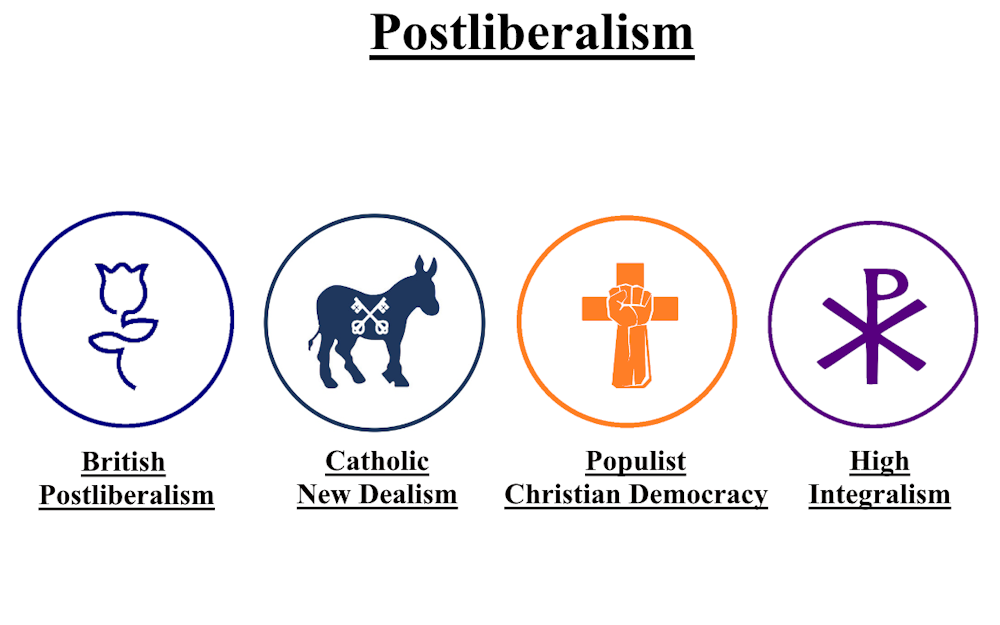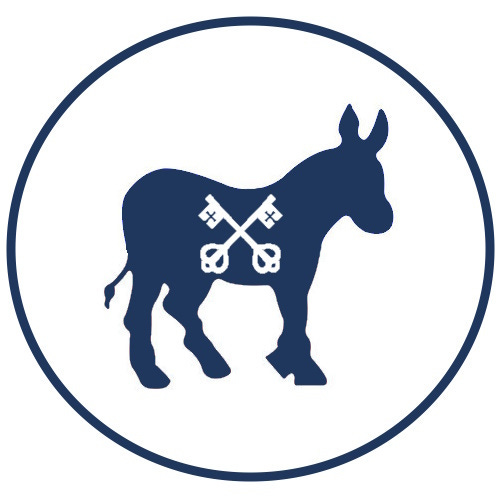One of the major groups of the Third New Right are the Postliberals. This group can broadly be described as communitarian, anti-individualist, economically left-leaning, and socially conservative (to varying degrees).
Postliberals have a high degree of establishment respectability, with them being able to write for mainstream liberal news outlets and have access to elite circles that no other group within the Rightosphere would have.
This is because the Postliberals stay away from the topic of race, focusing on vibe-based platitudes like community cohesion and the importance of family. When they are a little bit more spicy in regards to social issues, they are able to cover up their ‘homophobia’ with their (predominantly Catholic) religion, that has always been far more respectable than secular anti-LGBT rhetoric, partly because liberal elites know it will be far less effective at persuading people.
This easy access to establishment circles, and appropriation of Postliberal rhetoric by establishment politicians, make many in the Dissident Right, and even some others in the more mainstream Third New Right, suspicious of the Postliberals. Many sense, correctly in some cases, that they are crypto-liberals trying to appeal to conservative principles, and their theory amounts to little more than ‘vibes’. In Britain, David Cameron’s ‘Big Society’ is a perfect example of this, advertised as return to grassroots friendly societies and mutual aid when it actually involved bankrolling corrupt NGOs to spread Woke hegemony even more than Blair ever did.
The basic premise of Postliberalism, best outlined in Patrick Deneen’s book ‘Why Liberalism Failed’, is that liberalism, which it defines as an atomised individualism in both economics and culture, has created many modern problems, not just around Woke but also around family breakdown and the rapid rise in mental illness. This is because liberalism is based on a false belief in individuals being the primary unit of society, needing to ‘consent’ to any community obligations through the ‘social contract’.
Postliberals see this as false; humans have always lived in groups, and using the state to promote excessive individualism destroys the fabric of family and community. Therefore, society should re-emphasise community and reciprocal obligations, with ‘social contract’ replaced with a ‘social covenant’ of common rootedness and belonging.
This idea, that our modern problems stem from an excess of ‘individualism’ in both economics and culture, and that we need to return to a more communitarian spirit, is what unites Postliberals.
But aside from this, it is a very broad tradition, with some barely even qualifying as right-wing, and others advocating for Catholic theocracy. I will discuss four factions of Postliberalism, as the first entry in my analysis of all factions of the Rightosphere.
British Postliberals
This is, by virtue of its name, predominantly British. However, it is not exclusively so; with some American intellectuals like Christopher Lasch occupying a similar position. However, it is nowhere near as prominent in the United States, and almost all Postliberals over there are conservative Christians of some description (mostly Catholic).
British Postliberals are a mostly secular movement, though many have private religious belief. They mourn the passing of the ‘post-war consensus’, the communitarian post-1945 and pre-Thatcher Britain. They are mostly economically left-leaning, but suspicious of centralization, endorsing something similar to a British variant of Christian Democracy.
They can be in either one of the two main parties. ‘Blue Labour’ represents the Labour wing, and the Tory wing is represented by think-tanks like ResPublica and New Social Covenant Unit, who claim the mantle of Benjamin Disraeli and Harold Macmillan. Even though originally most of its theorists were on the left, it is more comfortable in conservative circles these days due to Labour’s Wokeism.
Intellectuals of this faction include Matthew Goodwin, David Goodhart, John Gray, John Millbank, Sebastian Milbank, Adrian Pabst, Phillip Blond, Maurice Glasman, Danny Kruger, William Clouston, and Paul Embery. In terms of minor parties, the modern ‘Social Democratic Party’ (SDP) led by William Clouston, which is economically left-wing, communitarian, and nationalist whilst not being overtly religious, is its primary representative.
In terms of literature, Adrian Pabst’s ‘Postliberal Politics’ (2021), Maurice Glasman’s ‘Blue Labour: A Politics of the Common Good’ (2022), and Danny Kruger’s ‘Covenant’ (2023), are a good summary of the ideas and overall tone of this tendency.
British Postliberalism has been criticised as an inherently nostalgic and reactionary vision, just ‘vibes’ easily appropriated by mainstream British politicians like Theresa May, Lisa Nandy, and Keir Starmer. However, I include it because it is an important tendency within the still young British Conservative Movement, represented by outlets like The Critic and UnHerd, and therefore must be engaged with.
Catholic New Dealers
The American Postliberal movement is represented by the ‘triad’ of three thinkers, Sohrab Ahmari, Patrick Deneen, and Adrian Vermule, who all represent different strands of the movement. I will separate these strands because whilst all echo familiar themes and have the backdrop of conservative Catholicism, their approach to politics is really quite different.
Sohrab Ahmari, as of 2024, represents the faction I like to term the ‘Catholic New Dealers’.
Up until Obama’s Presidency, members of this tendency would be fairly comfortable Democrats, with Ahmari in his current form (he frequently changes his views) fitting in very well with Catholic Democrats like Bob Casey Sr., Gene Taylor, and Dan Lipinski.
This faction is economically left-wing. They support a strong federal government protecting workers rights and providing a social safety net, strong tariffs, and industrial policy. Whilst anti-open borders, they believe in a multiracial working-class coalition being the vanguard of the anti-Woke revolution. They portray themselves as champions of the anti-Woke common man against the Woke rich, with them explicitly blaming neoliberal policies like free trade, open borders, and anti-trade union policies for the rise of Woke.
They are also prepared to work across the aisle, with Ahmari praising Joe Biden’s economic policies and criticising key right-wing figures like Elon Musk and Neil Gorsuch, despite their anti-Wokeness, for being anti-worker. Since around 2022 they have distanced themselves from other factions, due to disappointment in most of the Third New Right’s continued hostility to full-scale Social Democracy, and being very hostile to a ‘New Fusionism’ that reduces the Third New Right to anti-Wokeism.
However, despite their left-wing economics and criticism of excessive focus on ‘anti-Woke’, they are still socially conservative. They are very pro-life, support a complete ban on all pornography, and frequently condemn euthanasia and assisted dying. They are anti-LGBT, but see that only as one part of a socially conservative worldview.
Individuals representing this tendency include Ahmari, Vance, Matthew Schmitz, Darel E. Paul, Bantyar Ungar Sargon, Geoff Shullenberger, and Eudaimonia (husband of Shoe0nHead, strange match I know). Compact Magazine is the primary outlet where this tendency presents its ideas.
In another era they would very comfortably be on the left, and Ahmari’s book ‘Tyranny Inc.’ did get some grudging praise from socialist left publications like Jacobin and Sublation. However, because the American left today is so utterly uncompromising on social issues, as demonstrated by Chris Murphy’s Twitter poll, people like Ahmari are fighting a lost cause. They will either surrender completely on social issues, and become indistinguishable from leftists, or get nowhere.
Populist Christian Democrats
This group of Postliberals are more comfortably part of the modern Republican coalition. Like the Catholic New Dealers, in historical terms they would be Democrats, though early 20th century rather than New Deal-era, being more Jeffersonian compared to the Hamiltonianism of the Catholic New Dealer faction. This populist wing of the GOP fully completes the 120-year ‘Party Switch’, with people like Josh Hawley channelling some of the same sentiments as Democrats like Andrew Jackson and William Jennings Bryan.
Patrick Deneen outlined this vision in his book ‘Regime Change’. Unlike the Catholic New Dealers, that are pro-centralisation in a Franklin Roosevelt-type fashion, Deneen focuses a lot on subsidiarity, making him an old-school ‘Christian Democrat’ rather than a ‘Socially Conservative Social Democrat’ that Ahmari arguably is. Josh Hawley, who is a devout Christian but not Catholic, also subscribes to this tendency, and wrote an article in Compact titled ‘Christian Democracy for America’.
Deneen is sympathetic to the anti-Federalists (those who were opposed to the ratification of the constitution in 1789) and many of their proposals, as well as adopting some views of William Jennings Bryan like having workers and farmers representatives on the board of the Federal Reserve.
In Compact magazine, the flagship publication of the Catholic New Dealers, Hamilton Craig wrote an article unfavourably comparing the types of populism of different wings, seeing people like himself as akin to Teddy Roosevelt and the Bull Moose Party, and accusing people like Josh Hawley as being ‘Wilsonians’. This has some truth to it, though the fact Teddy is almost universally revered and Wilson almost universally reviled gives it a pejorative charge.
Unlike the Catholic New Dealers, who sometimes sound identical to the left on economic issues, Populist Christian Democrats are still clearly on the right. They understand the inevitability of elites, and instead of promoting left-wing talking points, explicitly state that they want to replace the current Woke elite with a socially conservative elite. On economics, they effectively want a slightly more economically right-wing, socially conservative version of post-war German Ordoliberalism, with decentralisation of decision making, and a rigid class structure but one where all classes work in social harmony.
The Populist Christian Democrats tend to be very enthusiastic supporters of Viktor Orban’s Hungary, whereas the Ahmarite Catholic New Dealist faction tended to prefer Poland’s Law and Justice party when they were in power, representing the different emphases.
In addition to Patrick Deneen and Josh Hawley, other individuals that would fall under this tendency include Gladden Pappin, Phillip Pilkington, R. R. Reno, and Rod Dreher. Miriam Cates would be a British representation of it. Publications falling under this tendency include First Things and the Substack ‘Postliberal Order’.
High Integralists
This is the faction of American Postliberalism represented by Adrian Vermule. The ‘High Integralists’, distinguished as ‘High’ because the other American Postliberals are also sometimes described as Integralist, are far more openly theocratic, and explicit in their desire for a centralised Catholic state where Catholicism would have favoured status as the ‘One True Faith’.
In addition to Vermule, their worldview is represented by the Substack ‘The American Postliberal’, with frequent contributors being Luca Adomo and William Benson.
Vermule likes the idea of the Supreme Court imposing a vision of morality, with him heavily criticizing the doctrine of Originalism; he just wants it to be Catholicism instead of liberalism, his ‘Common Good Constitutionalism’ a mirror image of the ‘Living Constitution’. He believes the law needs to make moral value judgements, that the left does but the right does not.
For instance, Vermule is critical of Dobbs vs Jackson Woman’s Health Organisation for only returning the matter of abortion to elected officials, and not banning it across the United States on the basis of the ‘sanctity of life is non-negotiable’, regardless of popular will, like liberals did with gay marriage.
Adrian Vermule, in contrast to Ahmari and Deneen, celebrates the managerial state, but simply wishes to utilise the managerial state built by the Woke to impose Catholicism instead. As opposed to the populist approach of the former, Vermule is very much an elitist, and believes in a strategy entirely focused on winning elites, and the rest will follow.
The ‘High Integralists’ very much believe in state-imposed mandated morality to a much greater degree than the other Postliberals, on the basis that freedom to sin is not real freedom, and that the state has the duty to save people from eternal damnation they would endure for not being Catholic. They outline a plan to, like Constantine in the Roman Empire, turn the United States into a majority Catholic country, with all of the same Machiavellian tactics.
They may sound far-fetched, but they have a very sophisticated, elite feel which indicates they will be a force to reckon with in the coming decades.
Conclusion
Postliberals are not a ‘very online movement’, they exist primarily in establishment circles. They are treated very favourably by the mainstream liberal press in comparison to other factions, despite the radicalism of Adrian Vermule’s ‘High Integralist’ faction.
Even though the High Integralists share similarities with the ‘Christian Caesarist’ faction of the Dissident Right, there is generally not very much interaction between Integralists and the Neoreactionary crowd, with the Integralists seeing such tendencies as beneath them. Academic Agent did an (unfortunately now paywalled) good podcast episode analysing the various Postliberals. In addition, Patrick Casey’s Twitter thread shows you the very clear line between the Postliberals and the more race-focused sections of the right.
I hope you enjoyed reading this first entry of ‘Factions of the Rightosphere’. Please like, follow, and share.
Click here for the next entry, on the National Conservatives.









A worthy display of clarity and concision; you do a great job summing up in a few paragraphs the various factions' progenitors, rhetoric and (where possible) political programs.
Much of this stuff is so woolly as to be unworkable. All the same--except for the high integralists, who have the clearest program but are downright repugnant--I can't imagine that *any* of these factions wouldn't improve things to some degree if they came to power. In fact there seems to me not much between them: the phrase 'narcissism of small differences' springs readily to mind.
But do these people even *want* power, or are they just so many pied pipers, obscurantist jesters and crumb-gatherers at the tables of the elites? Disputes between 'Jeffersonians' and 'Hamiltonians' or, even more so, 'Rooseveltians' and 'Wilsonians', while admirable for their historical literacy, are at best a bit quaint. Seen more realistically, the pursuit of petty distinctions on such grounds reeks of impotence, distance from power or--in the worst cases--strivers and grifters pandering to the lizard class and covertly benefiting from its largesse.
Revealingly, unless I'm very much mistaken, what they have in common is that they're 'race blind'. As such they are incapable of solving the primary issue of our times: mass immigration, not 'individualism', 'liberalism' or 'atomisation', which are secondary (individualism and liberalism, without the scare quotes, are sort of a feature-not-bug of the Western tradition, anyway, and were never a massive problem before the inception of mass immigration). The high integralists--other Catholic factions, too, but especially them--even approve of it, provided it comes from the Catholic Third World.
Good article, will be following for future analysis.